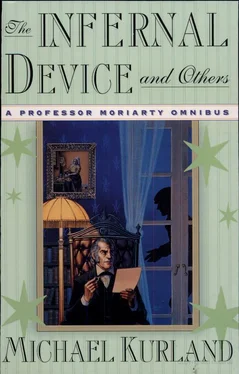"In the dining room?"
"No, in the drawing room. But as I happened to mention that I had not yet broken my fast that morning, Quimby suggested that he have the cook prepare one of her French omelets for me while I waited. I was agreeable, and so I proceeded into the dining room, where I found Lord John."
"It all seems quite clear," Holmes said. "But why did you not notify the authorities? Surely the fact that the man was a member of the Continental Policies Committee is not, of itself, sufficient reason not to call the police when you find his blood-soaked corpse."
Lord Arundale pondered the question for a second, searching for the precise way to phrase his answer. "Lord John Darby had an older brother," he said finally, picking the words carefully, as one would pick the right gold shirt studs from a drawer full of almost identical gold shirt studs. "Midway in age between Lord John and the Earl of Moncreith. His name is Crecy. Lord Crecy Darby. It is an old family name."
"Yes?" Holmes said encouragingly, as Lord Arundale fell silent again.
"I went to school with Crecy," Lord Arundale said. "Hoxley and then Cambridge. We were determined to go into government service together. Crecy was — is — brilliant. He was going to be the first prime minister appointed before his fortieth birthday. I was to be his foreign secretary. We had the details carefully planned." Lord Arundale sighed and shook his head. "Perhaps it was hubris," he said. "But at any rate, Lord Crecy Darby went completely insane over a period of three years. Every specialist in England and on the Continent was called in, and none of them offered any hope."
"What form did this insanity take?"
"He imagined that intricate plots were being woven about him; that complete strangers on the street had been employed by some invisible agency to follow him about; that everything that happened anywhere in the world was somehow directed against him. He became extremely sly and cunning, and would listen in at doorways and stay concealed behind drapery hoping to overhear someone talking about him.
"His father had him sent away to a sanitarium in Basel that had a new treatment that was thought to offer some small hope."
"What sort of therapy?" Holmes asked.
"I was never too clear on that," Lord Arundale said. "Something to do with hot salt baths and encouraging the patient to run about and scream, I believe. At any rate, he escaped from the sanitarium. Nothing was heard from him for two years. Then, on Crecy's thirty-second birthday, as it happens, the old earl received a communication from an attorney in Munich. Lord Crecy Darby, under the name of Richard Plantagenet, was on trial for the brutal murders of two prostitutes."
Holmes flipped his cigarette into the fireplace. "I remember the case," he said. "Although the true identity of the man who called himself Richard Plantagenet never came out. There was no doubt as to his guilt."
"None at all," Lord Arundale agreed. "He killed two streetwalkers by slitting their throats with a razor, and then mutilated their bodies in a horrible fashion. Not, I suppose, that there is a pleasant way to mutilate bodies. The trial cost the old Earl of Moncreith a fortune. He was not trying to have Crecy found innocent, you understand, but merely to see that he was spared the death penalty and that the family name remained concealed."
"And what happened to Lord Crecy?"
"He was found guilty and totally insane. He was placed in the Bavarian State Prison-Hospital for the Criminally Insane at Forchheim for the rest of his life."
"I see," Holmes said. "And so when you saw his brother lying dead with his throat cut, you naturally assumed that Lord Crecy must have escaped and returned to England."
"That is correct."
"And to save the present earl and his family from the grief and disgrace—"
"I did not notify the police but went straight to the Lord Chamberlain."
"Who agreed with you?"
"Of course."
"Bah!" Holmes said. "You are not above the law, my lord— neither as a member of the nobility nor as a member of the government. Acting as you have done can only be destructive of the moral fiber of British justice. Nothing good can come of it."
"I have heard," Lord Arundale said, "that you do not always work within the structure of the law. Was I misinformed?"
Holmes gazed sternly at Lord Arundale. "I have on occasion acted outside the law," he said. "But that and setting oneself above the law are two separate and distinct things. If you act outside the law you are still subject to it through the possibility of apprehension. But if you act above the law — if a burglar, for example, could go and clear his crime with the Lord Chamberlain first — then there is no law for you. And if there is law for some but not for others, then there is no law. For a law that is unequally applied is an unjust law, and will not be obeyed."
"You have strong opinions, sir," Lord Arundale said.
"So I have been informed," said Holmes, "on more than one occasion."
Lord Arundale carefully laid his cigar on the lip of the large brass ashtray on the table before him. "I did not come here for your approbation, Mr. Holmes," he said. "Neither did I come here for your censure. I came for your assistance in apprehending a murderer."
"You telegraphed to Forchheim?"
"I did."
"Lord Crecy, I presume, had not escaped?"
"Indeed he had not. How did you know that?"
"Never mind that at the moment, my lord. So the deaths of Lord John and the others are again a mystery."
"Even so."
"And you suspect a possible political motivation. Were any of the other victims connected with the Continental Policies Committee, or otherwise involved in government activities?"
"Isadore Stanhope, the barrister, was an agent for the Austrian government," Lord Arundale said. "George Venn had no known connections to any government, but he is said to have taken frequent trips to Paris. The purpose of these trips is, as yet, unknown. It is being looked into."
"And what of Lord Walbine?"
"A quiet man of independent means. Seldom left London except to return to his ancestral estate near Stoke on Trent, and that but twice a year. The only thing of interest we've been able to find out about the baron is that he had a rather large collection of, let us say, exotic literature in a concealed set of bookcases in the library."
"What fascinating things one finds out about one's fellow man when one is compelled to search through his belongings," Holmes commented.
"Will you take the case?" Lord Arundale asked.
"I will," Holmes said. "As a problem, it is not altogether without interest. I was sure when I saw you arrive, my lord, that you would have something stimulating to offer. And so you do."
"Have you any ideas?"
"My dear Lord Arundale," Holmes said, chuckling, "I'm afraid that you have been given an exaggerated notion of my abilities. Even I cannot solve a crime before I have assimilated its details."
"Well, I wish you luck," Lord Arundale said. "Any assistance you require will be immediately forthcoming from Scotland Yard."
"That should prove to be a novel experience," Holmes said. "I will have to tell Inspector Lestrade and his people of the circumstances surrounding the death of Lord John Darby, you realize."
Lord Arundale rose to his feet. "I leave that to you," he said. "If you feel you must, then do so. As to your fee—"
"My fees are on a standard schedule," Holmes told him. "I shall send my bill to the Foreign Office."
"That will be satisfactory," Lord Arundale said. "There is one last thing you should know."
"And that is?"
"I have just received a second telegram from Forchheim. After being informed of his brother's death, Lord Crecy killed a guard and escaped from the asylum. That was yesterday. Presumably he is headed back to England, possibly to avenge his brother's death. Unless he is apprehended on the Continent, he should be here within the week."
Читать дальше












